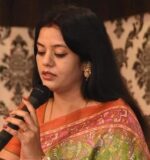TRANSLATED FROM THE HINDI BY AYUSHEE ARORA
… For all kinds of uses, there will be no cheaper creature than a woman, in our way of life.
The three-month-old, newborn girl had been crying all night, and her breathing was laboured and sporadic. Seventeen-year-old mother Vandana kept lying on the cot with her daughter all night, sometimes lying on one side, sometimes on the other, patting her to sleep. She kept rocking silently. The in-laws were asleep in the courtyard. They might have been listening, but neither did the daughter-in-law want to call them nor did they come when asked. Outside, the rustling of leaves on the neem tree could be heard. Who could be walking on this path so late at night? Was it some visible death, which was lurking outside? Was it here to take someone away? Vandana hugged her daughter tightly to her chest.
In the morning light, the earth glistened like blood. A crow, a parrot, a mynah, or a crow would occasionally make a sound. The village echoed with the cries of peacocks from the ancient trees outside. It must be just half past dawn. Did Vandana get up this early, or had she never slept at all? She filled a bucket from the hand pump in the courtyard and hurriedly went to take a bath. She bathed at this time every day, regardless of the weather. Her mother-in-law, Ramdasi, insisted on Lakshmi bathing and then going to the kitchen to do her chores.
Vandana knew that she could she take her daughter for treatment only after completing her kitchen chores. By sunrise, she had completed the cooking. Ever since the birth of her daughter, she would feel hungry from daybreak itself, and now, without even asking her in-laws, she would sit in some corner and quickly gulp down two or three rotis—sometimes with sweetened milk, sometimes with pickle, sometimes plain. Let the mother-in-law complain; she would eat her fill of bread. After all, she needed fuel in her stomach to work all day with the cows and buffaloes, manage the household, and take care of the baby, especially as a new mother.
Quickly finishing her work, she approached her mother-in-law with the intent of seeking permission and said, “Guliya has been crying all night. She can’t breathe. We’ll have to take her to Indargarh hospital.”
“Who is at home to take your offspring to Indargarh? My son has already gone to Pura. And even if he goes to Indargarh, the day’s work in the fields will be wasted. We’ll see tomorrow or the day after.”
“By tomorrow, my daughter will die!”
“If she dies, the circumstances of this house are hardly likely to change! If she’s meant to die, let her die! You go to the cattle shed. The animals must be hungry.”
“My daughter’s death will be on your head!”
Without stopping, the daughter-in-law, wiping her tears, picked up the brass bucket and went to the cattle shed.
Ramdasi sat there stunned. It had been over a year since her daughter-in-law had come into the house. Until now, she had neither lifted her veil nor answered back. Today, she had retaliated with such sharp words. It meant that her patience had reached its limit. If she tormented this daughter-in-law any further, she would either leave with her son or go back to her parental home.
Ramdasi went to the attic to check; the baby, exhausted, was restless even in her sleep. A rattling sound was coming from her chest. She must have double pneumonia. She couldn’t breathe; she was gasping for air. Despite telling her daughter-in-law countless times to be cautious with food after childbirth, this irresponsible woman kept eating indiscriminately! She ate eggplant! She consumed bowlfuls of pigeon pea lentils! She had a craving for buttermilk! The elderly mother-in-law silently began to scold her daughter-in-law in her mind.
When the baby started crying, she had no choice but to pick her up. For the first time in three months, she had held her granddaughter. Ramdasi herself had experienced something similar with her first child, who had suddenly died within fifteen days of birth.
Back then, her father-in-law used to say, “The death of a daughter brings eternal peace, just like an early morning bath brings comfort for the entire day.” If a daughter died, it brought lifelong happiness. After that, she had two sons and became a queen in the eyes of society, her family, and her relatives. Now, when her daughter-in-law gave birth to a daughter, it seemed as if the same cruelty had descended upon her.
Not even fifteen days had passed since childbirth, and Ramdasi had put her daughter-in-law back to work with the cattle, household chores, and everything. She had even refused to look at the newborn’s face. Now, she saw that the baby looked exactly like her younger son but was so thin and frail, like a doll made of clay. Should she kill her? She had always suspected that her mother-in-law had killed her newborn daughter by feeding her tobacco.
Ramdasi stroked the baby’s head, kissed her forehead, and then laid her back down. Did anyone see her showing affection to her granddaughter? She sat outside. The daughter-in-law quickly returned after feeding and watering the cattle. It was evident even from a distance that she was crying under her veil, as made clear by her swollen eyes.
“Don’t show the world your tears as if we’re killing the mother and daughter!” her mother-in-law said, taking out two ten-rupee notes from her knot and handing them to the daughter-in-law.
Her husband earned in thousands. There were crops worth lakhs in the fields, but this unfortunate Vandana had to extend her hand before her mother-in-law even to buy a betel leaf. The sliver lining was that the vermillion in her hair parting, which her husband applied, happened maybe once in fifteen days or one month. When he did come, he engaged in such horrifying debauchery all night that for the next one and a half days, she wandered around half-dead.
In the darkness, Vandana quickly ran with her sick child. She needed to take her to the healer beyond the village, but how could she go alone? Should she take Seva, the neighbor’s daughter-in-law, along with her? Quietly, with a long veil covering her face, she tiptoed to the neighboring house. Seva’s mother-in-law saw her entering but ignored it. How did this mad Seva become her friend? In truth, Seva wasn’t mad; her mother-in-law knew this in her heart. She was just unfortunate not to have been able to bear children, so her husband had remarried. Now, where could she go? She worked like a servant in exchange for food and shelter, toiling in the fields and the house. In a corner of the village, she lived in a small house where her husband visited every few months. Whenever he came, his other wife would nearly go mad. Once, she even came to the village with her children. Most of the time, Seva worked like an ox in the fields, tending to the cows and buffaloes, and managing the household chores. Occasionally, she would be seized by a fit and would stay in the darkest attic for a day or two, then return to work as if nothing had happened. The whole neighbourhood and the relatives kept their daughters-in-law away from her, fearing that they might be affected by her condition. Once the upper air takes hold of someone, it never leaves.
Vandana saw her friend lying on the cot, staring blankly into space with half-closed eyes. Her head was covered, hair dishevelled, lips swollen, and cheeks bruised, likely from a slap. She knew that Seva’s father-in-law had assaulted her again. Why didn’t her mother-in-law say anything? Do women sell their souls in exchange for shelter and food? Shouldn’t they fear the afterlife? Seva’s mother-in-law performed so many rituals and prayers, wore religious necklaces, and followed strict rules, yet did nothing to protect her daughter-in-law.
Vandana left as quietly as she had come. If she returned home, she might not be able to leave again. So, she set off alone to take her child to the healer beyond the village. She passed through the village, crossed the fields, and reached the place under the peepul tree. There, a woman was swaying while the healer, with a broom made of peacock feathers, was trying to exorcise her. Family members were holding the woman down.
Vandana felt a surge of fear. She wanted to turn back but looked at her daughter. The baby couldn’t breathe, couldn’t drink milk, and now couldn’t even cry. Seeing her, the healer motioned her to come inside the hut.
“Take off the baby’s clothes and lay her on the ground,” he said.
She laid the baby on the bare ground. The healer chanted some mantras, waved peacock feathers over her, and then began heating a rod on the burning embers.
Vandana wondered what was happening.
“We’ll have to perform the dagni. She has pneumonia. Sit outside near the kadamba tree and don’t look this way.”
She got up but hesitated and turned back. In a moment, the healer marked the baby’s body with the hot rod.
“Stop! Stop!”
“Why didn’t you remove her diaper? Is she a girl?”
Before Vandana could rush forward to snatch her baby from his hands, the healer removed the cloth and branded the baby’s private parts with the burning rod.
The baby screamed in pain, emitting a deathly shriek. The healer, half-focused, stood up and went outside with the hot rod to treat the woman swaying under the tree, held down by her family.
The distraught mother gathered her newborn baby and fled from there. She ran along the dusty paths, crying all the way. Why did she go to the healer? Why did she listen to her mother-in-law? She had passed the eighth grade and used to read newspapers at her parents’ home. Why didn’t she think that from birth to death, a woman’s body is a target of violence? Even after death, these bodies are violated; her baby was still alive. How could she have handed her living child over to the healer?
She kept running until she reached Gola, three kilometers away. From here, she could catch a bus to Indargarh. While waiting for the bus, she examined her baby’s wounds. The skin was peeled, burnt, and bleeding. The newborn was sobbing in pain, and the mother felt her own helplessness keenly.
She boarded the bus and took the ticket to Indargarh—it cost twenty rupees! Vandana had a few more notes of ten and five rupees, some of which she had received from relatives or policemen when she touched their feet. Why didn’t she have any money left—she wondered. She had always wanted to study. She dreamed of building a better life, inspired by the words of the headmistress during prayer assemblies. But after eighth grade, there was no school in the village, and her parents didn’t allow her to go to the school four kilometres away in the neighbouring village. Concerns about reputation, caste, and other imaginary accusations kept her confined to the house. Yet, she was made to work extensively. Vandana managed the entire household for her four siblings. Her mother often lay bedridden due to her chronic illness. Young Vandana, forced into the role of a homemaker prematurely, quietly learned a skill from the village women—sewing. She became exceptionally good at it, creating such beautifully designed blouses, kurtas, and frocks that people from neighbouring villages started commissioning her sewing work. When she turned sixteen, her parents arranged her marriage, unburdening themselves. Her mother kept the sewing machine for the younger daughter.
In her in-laws’ house, no one allowed her to sew, saying that they didn’t need to live off a woman’s earnings. She worked tirelessly, yet she had to beg her mother-in-law for even five or ten rupees. She didn’t even know how much her husband earned. Whenever she asked, he would tell her that he was saving money to take her to the city. She endured her mother-in-law’s cruelty and her father-in-law’s and brother-in-law’s lewd glances. In the future, would she have to endure her husband’s debauchery and assaults in the city? What lay ahead in life? Her parents were even worse than her in-laws. There was no light, no path visible. She hugged her daughter tightly and looked out the window of the bus. There was a rocky barrenness as far as the eye could see. The heat was oppressive. In the small villages with tiny huts, there was only hunger and unemployment.
She got off at the Indargarh bus stand. The hospital was one and a half kilometers away. How could she afford any fare for a ride? She started walking. What would happen to her when they found out she went to Indargarh alone? Once, her mother-in-law had thrown a full pot at her, and her ribs ached for many days. Sometimes her mother-in-law pushed her, sometimes snatched things from her hands. And the scolding, insults, and taunts were a constant in her life. Even so, Vandana wanted her mother-in-law to stay at home; the mere thought of being alone with her father-in-law filled her with dread.
The hospital was in sight. Not really a hospital, just a dispensary with three or four rooms. She showed her baby to the compounder.
“You village folks are crazy! Illiterate! Fools! You burn your children with hot rods and bring them to us when they are on the brink of death!”
Vandana stood there with folded hands, unable to find the words to plead.
“Take her to the hospital in Datiya. We can’t save her here!”
The compounder referred her to the Datiya hospital. The government doctors were always absent from such remote hospitals. The doctor transferred here six months ago never joined. He managed to stay in the city using his connections. The previous doctor, who was here for seven years, only came once or twice a year for inspections, when he had to bribe the inspectors with gifts. The doctor before him sent a quack in his place, paying him a hundred rupees a day. When a few people died under his care, he was transferred, narrowly escaping murder charges by paying six months’ salary.
She came out of the hospital. How would she go now? An ambulance was parked in the premises, but the driver said it had no petrol. It had been sitting there for months.
What should Vandana do now?
She counted the ten rupees and five-rupee coins in her purse. Fortunately, she also found a fifty rupee note.
“Seventy rupees worth of petrol won’t get the ambulance to Datiya!”
The desperate mother sat on a bench under the teak trees in the hospital premises, her head in her hands. What could she do? Should she beg from passersby? Her parents had snatched away her school bag and thrown her into household chores. What could she do? Her father had forged her age on an Aadhaar card to marry her off while she was still underage. She endured all the atrocities at her in-laws’ house. She worked day and night, but what else could she do? Her daughter was born; this child was her life. No one else may want or accept her, but she was Vandana’s treasure. If she couldn’t get the ambulance, she would go to Datiya. She would take a bus, she would walk, but she would save her child. Whatever happened when she returned to her in-laws’ house would happen. At worst, they might beat her senseless.
Vandana prayed to her gods and goddesses. She stood up from the bench to go to Datiya. What was this? No movement?
With halted breaths, burning wounds, and a blood-soaked body, her newborn’s soul had departed.
“Guliya!!” The tearful mother rocked her lifeless baby, patting her, holding her close to her chest, cradling her in her arms, and caressing her. Then she stared around in shock. In every direction, she saw her life’s memories playing out like scenes in a mirror. She was everywhere around the bench! No, it was Guliya—Guliya everywhere! Was she Guliya? Or was Guliya her?
The mother laid her baby on the bench with a smile and began dancing around it. If anyone tried to stop her, she danced even more vigorously. She danced until she finally collapsed, unconscious.
Also, read Forgetting is Not Really a Decision by Jaishree Roy, translated from the Hindi by Rituparna Mukherjee and published in the Antonym:
Follow The Antonym’s Facebook page and Instagram account for more content and exciting updates.




























0 Comments